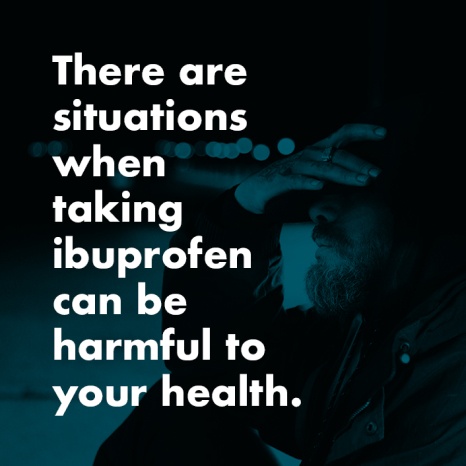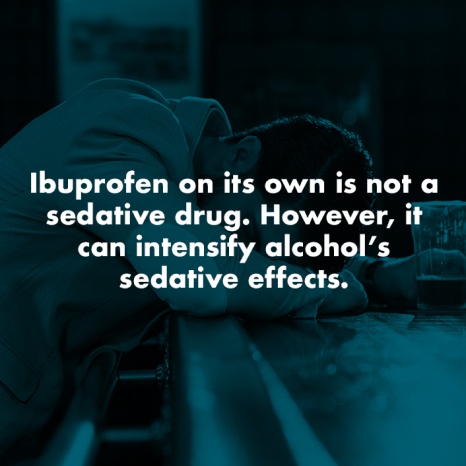Ibuprofen and Alcohol
Ibuprofen is a common non-steroidal anti-inflammatory drug (NSAID). Popular as a mild pain reliever, it goes by the brand names Advil and Motrin. It is also a common ingredient in other medications that treat fever, flu, migraine, and severe pain. It’s available in a wide range of doses, both over the counter and by prescription. While Ibuprofen and alcohol is not a commonly known combination to cause serious issues, it is always best to avoid mixing when possible and practice care.

Side Effects of Ibuprofen:
- Stomach ulcers
- Internal bleeding
- Headaches
- High blood pressure
- Stomach discomfort
- Longer healing time for wounds and cuts
- Dizziness
- Kidney problems and failure
- Liver problems
- Heart attack
- Stroke
Most people think of ibuprofen as a safe occasional pain reliever. However, there are situations when taking it can be harmful to your health. It can interact negatively with many medications, and isn’t always suitable for people with conditions such as asthma.
Mixing Ibuprofen And Alcohol
Ibuprofen can be especially dangerous when mixed with alcohol or other recreational substances. Even though it doesn’t produce or enhance a high, it can still intensify the negative side effects of alcohol and other drugs. Similarly, alcohol can worsen ibuprofen’s negative side effects.
Ibuprofen should always be taken at the lowest dosage needed to relieve pain, and you should never take it for extended periods of time. While a low dosage of Advil and alcohol is generally not dangerous, there is no way to predict how this will affect an individual. Depending on the dosage, frequency, and individual health factors, the effects of mixing ibuprofen with alcohol can be mild, severe, or sometimes even fatal.
If someone takes ibuprofen regularly (or takes more than the recommended dose) and drinks more than a small amount of alcohol, negative side effects can show up. A moderate amount of alcohol is different for everyone, but is usually around one drink for women and two drinks for men each day.
MountainView Recovery
5475 Mark Dabling Blvd #102
Colorado Springs, Co 80918
Contact Us Today!
MountainView Resources!
Side Effects Of Ibuprofen And Alcohol
Ibuprofen on its own is not a sedative drug. It will not cause drowsiness or “brain fog.” However, it can intensify alcohol’s sedative effects. The pain relief it provides can increase the feeling of relaxation that alcohol creates. With ibuprofen, your reflexes and responsiveness can slow down even more than with just alcohol. For instance, though drinking and driving is never a good idea, someone mixing ibuprofen and alcohol might drink more than a safe amount before driving without knowing it.
With the PM versions, sedation does occur. Similarly, with a low dosage in combination with alcohol the effects should not typically be terrible. However, again the effects vary from person to person due to various factors. Still, it is always best to avoid mixing sedatives as sedatives often slow breathing and heart rates, which at a high enough dosage can be fatal or cause serious long-lasting health issues.
Kidney and Liver Damage
Ibuprofen and alcohol both stress the kidneys and liver, even in moderate doses. When taken together, they can increase the risk of serious, long-term damage and even kidney and liver failure.

Substance Abuse Recovery
If you are struggling with substance abuse of any kind, contact us today. It is our mission to compassionately empower every client who walks through the door of Mountain View Recovery Center. Our vision is to provide support and structure in a community-based, clinical setting using evidence based practices. Our purpose is to break the stigma of addiction and show our clients a united way to lifelong recovery.
FAQS
Can you overdose on Ibuprofen?
Yes. Although taking ibuprofen does not cause or increase a high, taking too much can cause serious physical harm. Always use it exactly as directed, and do not mix with other medications unless directed by a doctor. In rare cases, an ibuprofen overdose can be fatal. More often, however, internal problems develop slowly from repeated, low-grade overdose (such as taking one or two pills too many).
Is ibuprofen addictive?
Ibuprofen is not considered an addictive medicine, but it can still play into substance abuse and increase the risk of overdose from other drugs. It is also not intended for habitual or long-term pain relief use.
Is Ibuprofen a blood thinner?
While ibuprofen is not actually a blood thinner, it can have a similar effect. If you cut yourself with ibuprofen in your system, it will take longer for your blood to clot and close the wound. You should not take ibuprofen with other blood thinners, especially without first consulting a doctor.
Is it safe to mix acetaminophen and alcohol?
Like Ibuprofen, acetaminophen is a common over-the-counter pain reliever. Similarly, taking acetaminophen while drinking alcohol can stress internal organs and potentially cause serious side effects. Small amounts taken together on rare occasions are generally safe.
Mountain View Recovery Treatment Programs
Patient Resources
Addiction is complex, which means treatment and long-term recovery are complex. Despite this, it shouldn’t scare anyone – patients or their loved ones. It just means that treatment and recovery both require thorough and thoughtful planning.
Outpatient Program
Our outpatient program (OP) is a transition preparatory phase. It provides a minimum of nine (9) hours of weekly outpatient treatment. This involves a minimum of one (1) hour/s individual substance abuse/behavioral health counseling per week.
Adventure Therapy
For a long time, nature has been seen as a balm to the problems we face in society. Even during pre-industrial times, people would seek out the countryside as a means to feel better. Many people have also used nature as a way to understand the world.
Trauma and Recovery
Just like physical trauma occurs, so does psychological trauma. Any number of traumatizing events occur and cause psychological trauma. A lot of people will experience trauma before or because of addiction. It’s possible for addiction to deepen…
Neurofeedback
Nobody sets out with the intention of becoming addicted to anything. Even someone making a conscious decision to try substances is not intending to become dependent, experience withdrawal, and risk overdose or death. There are numerous factors.
